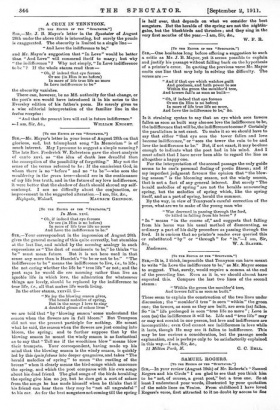[To TER EDITOR OP THU "SPECTATO8.1 SLE,—One hesitates long before
offering a suggestion to such a critic as Mr. J. B. Mayor, yet it seems possible to explain and justify his passage without falling back on the hypothesis of a printer's error. In quoting the previous verse Mr. Mayor omits one line that mqy help in solving the difficulty. The verses are :- " And if that eye which watches guilt
And goodness, and hath power to see Within the green the moulder'd tree, And towers fall'n as soon as built- " Oh, if indeed that eye foresee Or see in Him is no before) In more of life true life no more, And Love the indifference to be," &a.
Is it straining syntax to say that an eye which sees towers
fallen as soon as built may also see love the indifference to be, the indifference that will be, the indifference to come ? Certainly
the parallelism is not exact. To make it so we should have to say that either "that eye sees the tower fallen and love become indifference," or "sees the tower the ruin to be and love the indifference to be." But, if not exact, it may be close enough to indicate what the poet had in his mind. And I must admit that I have never been able to regard the line as
altogether a happy one.
For the interpretation of the second passage the only guide
seems to be one's personal feeling of poetic fitness ; and if my imperfect judgment favours the opinion that " the blow- ing season" is the blooming season, not the windy season, that is not a fact of any general interest. But surely " The herald melodies of spring" are not the heralds announcing spring, but the melodies of spring -which, like the spring
itself, and as a part of spring, herald the summer.
By the way, in view of Tennyson's careful correction of the
press, what are we to make of the young man who
"Was drowned in passing through the ford, Or killed in falling from his horse" ?
"In " means " in the course of," and suggests that falling from his horse was his usual method of dismounting, as ordinary a part of his daily procedure as passing through the ford. It is curious that no printer's reader ever queried this or substituted " by " or " through " for " in."—I am, Sir, Haslemere.






































 Previous page
Previous page